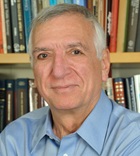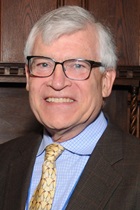The American Society of Hematology Honors William Eaton, MD, PhD, and Richard A. Larson, MD, with the 2019 Henry M. Stratton Medal
(WASHINGTON, July 12, 2019) – The American Society of Hematology (ASH) will recognize William Eaton, MD, PhD, of the National Institute of Diabetes and Digestive and Kidney Diseases (NIDDK) of the National Institutes of Health (NIH) and Richard A. Larson, MD, of the University of Chicago with the 2019 Henry M. Stratton Medal for their seminal contributions to basic and clinical/translational hematology research, respectively.
The Henry M. Stratton Medal is named after the late Henry Maurice Stratton, co-founder of Grune and Stratton, the medical publishing house that first published ASH’s flagship journal Blood. The prize honors two senior investigators whose contributions to basic and clinical/translational hematology research are well recognized and have taken place over a period of several years. Drs. Eaton and Larson will accept their awards on Tuesday, December 10, during the 61st ASH Annual Meeting and Exposition in Orlando.
“I am thrilled to be the recipient of this very prestigious award,” said Dr. Eaton, the basic science award recipient. “I attribute much of my success to early advice from a mentor: search for important questions and answer them before anyone even knew that there was such a question.”

Dr. Eaton, an NIH Distinguished Investigator and chief of the Laboratory of Chemical Physics at NIDDK, is being recognized for his pioneering work on biochemical and biophysical research on sickle cell disease (SCD) pathophysiology and drug therapy. Notably, he described the sickle hemoglobin polymerization reaction that causes red blood cell sickling and also delineated the protective effects of fetal hemoglobin. This work led to a better understanding of the idea that proper treatment can result from replacing a limited fraction of sickle hemoglobin with fetal hemoglobin. His research contributed to the development of hydroxyurea, an effective therapeutic agent for SCD that slows sickling of red cells by inducing fetal hemoglobin synthesis. Dr. Eaton’s research group has also developed a sensitive test for measuring the time it takes for a blood cell to sickle, in hopes that being able to slow sickling will prevent complications such as blood vessel obstruction. His current research is focused on high throughput screening of drug libraries, with the aim of discovering inexpensive oral drugs for SCD that can be used worldwide, particularly in low-resource areas.

Dr. Larson, professor of medicine and leader of the Hematologic Malignancy Program at the University of Chicago, is the recipient of the clinical research award. His career has been dedicated to the design and leadership of groundbreaking therapeutic trials for patients with leukemia, and he has made significant strides in understanding the genetic basis of leukemia and translating these insights into more effective treatments for patients. Dr. Larson led the Leukemia Committee of the Cancer and Leukemia Group B (CALGB), now called the Alliance for Clinical Trials in Oncology, at a time when tremendous progress was being made to identify recurrent genetic mutations across multiple different types of acute and chronic leukemias. Under his leadership, CALGB completed 42 clinical trials, more than 170 presented abstracts, and 142 published reports, many of which have had an impact on clinical practice. His insights into the genetic basis of leukemia have inspired therapeutic concepts for adults with acute lymphoblastic leukemia; these were tested in CALGB studies and became known as the “Larson” regimen, a standard of care for a decade. More recently, he promoted the development of treatments designed for adolescents and young adults with leukemia. Dr. Larson also helped assemble a multinational consortium, together with colleagues from across North America, Europe, and Asia, to complete a randomized clinical trial that resulted in the approval of midostaurin, the first targeted therapy for FLT3-mutant acute myeloid leukemia, an aggressive type of cancer.
“My career has focused on understanding and recognizing leukemia to be a syndrome of many genetically distinct diseases and successfully translating that knowledge into more effective therapies for patients,” said Dr. Larson. “It is a great personal honor to receive this recognition from the international community of hematologists represented by ASH.”
“These two dedicated researchers were integral to some of the most significant advances in hematology patient care in recent history,” said ASH President Roy Silverstein, MD, of the Medical College of Wisconsin in Milwaukee. “From the identification of anti-sickling mechanisms that are inspiring a game-changing therapy for sickle cell disease to the development of personalized cancer therapies that give hope to patients with poor prognoses, Drs. Eaton and Larson have made an impact that will be felt for generations of patients and hematologists to come.”
The American Society of Hematology (ASH) (www.hematology.org) is the world’s largest professional society of hematologists dedicated to furthering the understanding, diagnosis, treatment, and prevention of disorders affecting the blood. For 60 years, the Society has led the development of hematology as a discipline by promoting research, patient care, education, training, and advocacy in hematology. ASH publishes Blood (www.bloodjournal.org), the most cited peer-reviewed publication in the field, which is available weekly in print and online, as well as the newly launched, online, peer-reviewed open-access journal, Blood Advances (www.bloodadvances.org).
Contact:
Sara Khalaf, American Society of Hematology
[email protected]; 202-552-4925